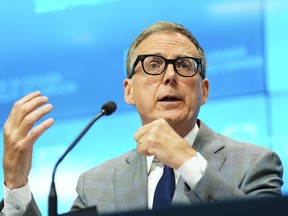Kevin Carmichael: Policymakers know too little about what drives entrepreneurs and executives
Article content
Abacus Data conducted a fascinating survey recently of smaller companies for Business Development Bank of Canada’s Small Business Week.
Entrepreneurs don’t feel good about where we’re at. More than 60 per cent of 600 respondents said they think the Canadian economy is doing poorly, while 29 per cent said they thought the economy was doing “pretty well” and only seven per cent said the economy was doing “very well.”
Advertisement 2
Article content
Article content
Smaller businesses are often described as the backbone of the economy, and ambitious upstarts tend to generate much of an economy’s employment growth as they scale. So, what these companies have to say is noteworthy.
But should we believe them?
The Abacus survey is fascinating because on an individual level, entrepreneurs appear to think that things are just fine. Some 80 per cent of respondents said their businesses will be doing well in 12 months, an extraordinary expression of confidence amid the worst bout of inflation in 40 years, the highest interest rates since 2007 and war in Europe and the Middle East.
And yet many of those same entrepreneurs appear to think they are special, because 56 per cent of respondents predicted the economy will be doing “poorly” 12 months from now. (Abacus conducted the poll between Oct. 11 and 18.)
“The majority of business leaders are confident about their managerial skills, which might influence their positive outlook on their own business despite a gloomy economic scenario,” Abacus chief executive David Coletto wrote in a summary of the results. “They believe they can navigate the challenges better than others.”
Article content
Advertisement 3
Article content
Getting inside the heads of the people who make investment and hiring decisions is something the policy establishment has tended to avoid, if only because it’s too hard. Sentiment data are widely used, but as the BDC/Abacus poll shows, feelings don’t always align with actions.
Entrepreneurs might sense that a recession is coming, but if they remain confident in their own prospects, and therefore continue to spend on research and development and additional staff, then that recession might not arrive. The Abacus research is a useful reminder that it’s wise to put more weight on what we humans do than what we say. It also shows there is much more we can do to understand how economies work.
That’s a lesson of the pandemic.
One day, when the inflation scare has gone away and the Bank of Canada has the headspace to think dispassionately about how it handled the aftermath of the COVID crisis, its leaders probably will conclude they know too little about what drives entrepreneurs and executives.

Bank of Canada governor Tiff Macklem and predecessors such as Stephen Poloz and Mark Carney came of age at a time when the economics profession had decided it could use math to reliably predict the future. By the 1980s, there was enough data and computing power available to run relatively sophisticated models that would create maps of where economies were headed, based on what had been measured previously.
Advertisement 4
Article content
Inflation targeting became the preeminent approach to monetary policy because recent history seemed to show that economies worked best when inflation is low.
The problem with the most popular models of the 1990s and 2000s was that they were largely based on the postwar decades, an unusually calm and prosperous time that benefited from never-to-be-repeated forces such as the rebuilding of Europe and Japan, the insatiable demand of American boomers, the expansion of the global economy to include cheap Asian labour and China’s meteoric rise from poverty.
Those tailwinds flattened the business cycle and minimized financial crises. They also fed a broad sense of overconfidence and complacency, as a willingness to learn from history was replaced by a near-religious belief in economic forecasts.
History caught up in 2008, when Wall Street, the International Monetary Fund and almost everyone else failed to foresee the events that led to the Great Recession. Post-mortems revealed that economic models lacked variables that would mimic the influence of finance on economic conditions, a massive blind spot considering bankers had financialized just about everything by the start of the millennium.
Advertisement 5
Article content
There was a lot of discussion in the aftermath of the Great Recession about how macroeconomics had failed and that a rethink was needed. Poloz led an overhaul of the Bank of Canada’s approach to modelling. Unfortunately, no one thought about how you’d model the effects of a global pandemic on consumer behaviour and fragile supply chains — and what could happen if one of the world’s major suppliers of oil and fertilizer invaded one of the world’s major suppliers of wheat while effects of the pandemic were still acute.
Macklem and others assumed the profit motive would incentivize businesses to quickly get supply moving again. It turned out to be more complicated than that. The mistake was understandable, but the consequences have been devastating. If the macroeconomists that dominate central banks had a better appreciation of microeconomics, they might have been able to keep a tighter grip on inflation.
“The experience of the past two years has forced policymakers to be humble and to acknowledge that we still have a lot to learn,” Bank of Canada deputy governor Nicolas Vincent said in a speech earlier this month. “We need to continue the hard work of incorporating new sources of data and improving our models to ensure that they better capture what is happening in the real world.”
Advertisement 6
Article content
The experience of the past two years has forced policymakers to be humble and to acknowledge that we still have a lot to learn
Nicolas Vincent, Bank of Canada deputy governor
Vincent said the central bank is now using “microdata” to better understand inflation dynamics. That work caused policymakers to realize that companies make pricing decisions differently when inflation is high than they do when inflation is low — an insight that would have been helpful in 2021, but at least central bankers are aware of it now.
Policymakers could do more than dig deeper into their troves of hard data. For at least a decade, Mohamed El-Erian, the former CEO of investing behemoth Pacific Investment Management Company LLC (PIMCO), has been calling on central banks to make better use of innovations in behavioural science and neuroscience.
What might that look like? It could involve better applications of sentiment data. That won’t be as straightforward as running some mathematical equations. Entrepreneurs tend to hold themselves in high self-regard, which in the case of the BDC/Abacus survey could mean they are overly confident in their abilities to survive an extended period of high inflation and interest rates. Or, it could mean they are unreasonably pessimistic about the wherewithal of the rest of us to survive the storm.
Related Stories
-

Canadians think inflation is higher than it actually is
-

Bank of Canada won’t rule out higher rates amid geopolitical risks
-

Growing wages may force Bank of Canada to raise rates again
Coletto might lean toward the later, as he noted the respondents to his survey were “preparing for growth.” That could explain why the recession some forecasters have been anticipating for two years hasn’t happened yet.
Bookmark our website and support our journalism: Don’t miss the business news you need to know — add financialpost.com to your bookmarks and sign up for our newsletters here.
Article content
Why Bank of Canada and other forecasters keep misreading the economy
2023-10-23 10:42:33









Comments
Postmedia is committed to maintaining a lively but civil forum for discussion and encourage all readers to share their views on our articles. Comments may take up to an hour for moderation before appearing on the site. We ask you to keep your comments relevant and respectful. We have enabled email notifications—you will now receive an email if you receive a reply to your comment, there is an update to a comment thread you follow or if a user you follow comments. Visit our Community Guidelines for more information and details on how to adjust your email settings.